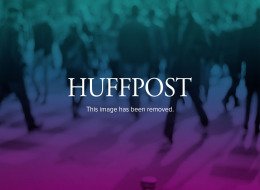White House Response To IRS Scandal Making The Situation Worse

Self-employed business owners get all the same tax benefits as larger businesses:
Businesses have a seemingly infinite ability to "write-off" certain expenses on their corporate tax returns, right? But what about business owners who file individual tax returns, as most self-employed businesses do? It turns out there are fewer tax perks for the self-employed business owner. For example, corporations are able to claim health insurance policies for employees as a business expense and their employees pay for those policies with pre-tax dollars. A self-employed business owner could have claimed tax relief for purchasing health insurance last year, thanks to a one-year self-employed health insurance tax deduction in the Small Business Jobs Act, but will have to go back to paying full freight with no tax relief next year, unless Congress decides to make the deduction permanent.
Even the tax perks specifically created for self-employed business owners can be a challenge. Taxpayers who work from home are entitled to take a home office deduction, but about 60 percent of those eligible for the deduction don't take it. One reason is that many taxpayers have heard that taking this deduction will create an audit risk, which may have been true once but was largely addressed by tax changes made in the late 1990s. The other reason for the low participation rate is that the deduction is notoriously difficult to calculate. Congress is considering solving this problem by creating a standard home office deduction, which would certainly keep more business owners from leaving money on the table when it comes to tax relief.
Read the Article at HuffingtonPost
White House Response To IRS Scandal Making The Situation Worse
Lending is readily available for small businesses in large and small amounts
When President Obama signed the Small Business Jobs Act last May, much attention was paid to the $30 billion Small Business Lending Fund that would be made available to community banks, credit unions and community development funds. This funding helped address the fact that neither the Troubled Asset Relief Program (TARP) funds nor industry bailouts specifically helped small businesses. Although the $30 billion in lending was authorized eight months ago, the Treasury Department has yet to distribute these funds, which means the community banks have not been able to boost small business lending as the legislation intended.
Further complicating the lending picture is the fact that self-employed business owners most often need what would be considered a "micro" loan to any lending institution, including a community bank. A business owner may only need $5,000 to invest in new office equipment or marketing efforts, but loans in such small amounts are not readily available through small business lending programs. Instead, this business owner has to use a personal credit card to make the investment, which typically has much less desirable terms and interest rates than a small business loan. What self-employed business owners need is recognition that these small loans are just as vital to business success as the larger loans that are supposed to be readily available.
Read the Article at HuffingtonPost Read more...
White House Response To IRS Scandal Making The Situation Worse
Most Americans work for large corporations:
Conventional wisdom used to hold that what's good for General Motors is good for America. While GM may no longer be the poster child for corporate America, large corporations can afford lobbyists who make sure their clients are first in line when legislation is drafted. One of the justifications in protecting the interests of corporations first is the notion that they employ the vast majority of Americans and that corporate interests are necessarily aligned with most workers'.
But large businesses only employ about 38 percent of the private sector workforce while small businesses employ 53 percent of the workforce. In fact, over 99 percent of employing organizations are small businesses and more than 95 percent of these businesses have fewer than 10 employees. The reality is that most Americans are employed by a very small business that has little in common with the tiny sliver of the business demographic represented by corporate America.
Job growth is driven by large employers:
Since most of us read about the handful of large employers in the business pages on a regular basis, we often assume that job creation depends on their success. While corporations do employ many Americans, small businesses account for 64 percent of net new jobs created. Many of these new jobs are also new companies -- the startup rate in 2010 was the highest it has been in 15 years, according to the Kauffman Index of Entrepreneurial Activity. More than half a million new businesses were created in 2010 as the poor economy and high employment rates have led more individuals into business ownership.
Historically, small businesses grow faster than their large counterparts, too. The average growth rate of a large company with more than 500 employees over the decade ending in 2006 was about 1.3 percent. In that same period the growth rate for America's smallest businesses, the self-employed, was 3.4 percent. As small businesses grow, they hire employees, buy goods and services from other businesses, contribute to the local tax base and support individuals and their families.
Read the Article at HuffingtonPost Read more...
White House Response To IRS Scandal Making The Situation Worse

Then there are the tax incentives that our tax code offers for sending U.S. jobs overseas.
Read the Article at HuffingtonPost
White House Response To IRS Scandal Making The Situation Worse

From yesterday's newspaper, here's a nice example of a scheme that are available to corporations to avoid paying taxes that aren't available to ordinary peons like you and me:
Apple Used Loopholes To Skip Paying U.S. Taxes On $44 Billion In Offshore Income, Senate Committee Claims
Read the Article at HuffingtonPost
White House Response To IRS Scandal Making The Situation Worse

Lie number 3) U.S. corporations are over-taxed.
Example: Republican presidential candidate Tim Pawlenty
We have the highest corporate tax rate, or one of them, in the OECD nations.Actually, as measured in terms of share of GDP, the U.S. has the lowest corporate tax burden of any OECD nation. While the official tax bracket may seems high -- 35 percent -- if one takes into account various loopholes and tax dodges, the effective tax rate is considerably lower, or around 27 percent, which comes in as slightly higher than average for OECD members. And according to ace tax report David Cay Johnston, the bigger you are, the less you pay -- the effective tax rate for the biggest U.S. corporations is only about 15 percent.
There you have it, for future handy reference. Poor people do pay taxes, the biggest corporations don't pay enough, and the United States, as a whole, has a low tax burden overall.
Read the Article at HuffingtonPost Read more...
White House Response To IRS Scandal Making The Situation Worse

Lie number 2) The U.S. suffers from high taxes.
Example: The Wall Street Journal's Stephen Moore:
What all this means is that in the late 1980s, the U.S. was nearly the lowest taxed nation in the world, and a quarter century later we're nearly the highest.Totally untrue. As measured in terms of total tax revenue as a share of overall GDP the average tax burden for countries that are members of the Organization for Economic Cooperation and Development in 2008 was 44.8 percent. The U.S. -- 26.1 percent. The U.S. pays less taxes, as a share of GDP, than Denmark, Sweden, Italy, Austria, France, Netherlands, Germany, United Kingdom, Canada, Spain, Switzerland and Japan.
Furthermore, as Bruce Bartlett explains in detail in The New York Times the current U.S. federal tax burden, measured, again, as a share of GDP, is only 14.8 percent -- a 60-year low.
KEEP READING
Read the Article at HuffingtonPost Read more...
White House Response To IRS Scandal Making The Situation Worse

The Top 3 Lies About Taxes:
Lie Number 1) Poor people don't pay taxes.
Example: From The Center on Budget and Policy Priorities:
At a hearing last month, SenatorCharlesGrassley said, "According to the JointCommitteeOnTaxation, 49 percent of households are paying 100 percent of taxes coming in to the federal government." At the same hearing, CatoInstituteSeniorFellow AlanReynolds asserted, "Poor people don't pay taxes in this country." Last April, referring to a TaxPolicyCenter estimate of households with no federal income tax liability in 2009, FoxBusiness host StuartVarney said on Fox and Friends, "Yes, 47 percent of households pay not a single dime in taxes."The Center on Budget and Policy Priorities' Chuck Marr and Brian Highsmith provide the definitive takedown of this myth.
In 2009, Congress' Joint Committee on Taxation found that 51 percent of households owed no federal income tax. According to Marr and Highsmith, that figure was inflated by special recession-related factors -- In a more typical year, "35 to 40 percent of households pay no federal income tax."
But that does not mean that these households pay no federal taxes at all. Far from it: Nearly all working Americans pay payroll taxes to fund Medicare and Social Security. In 2007, the poorest Americans -- taxpayers in the bottom fifth of income -- paid 8.8 percent of their income as payroll taxes. The next fifth paid almost ten percent. The top 20 percent of earners paid only 5.7 percent. And while the government has that money, they use it and make money off of it.
And of course, these numbers don't include state and local taxes or excise fees like gas taxes, which tend to have a regressive impact that hits poorer Americans harder. Bottom line: only 14 percent of Americans don't pay either federal income taxes or payroll taxes -- and that group is made up primarily of "low-income people who are elderly, unable to work due to a serious disability, or students."
The rich have gotten rich off of the sweat and labor of others and then have taken those profits to buy politicians who've gamed the system so that they wouldn't have to pay taxes through all manner of tax schemes not available to the poor and middle classes. The rich also 'closed the door' on the ways that initially enabled them to amass their 'seed money' for creating their businesses.
KEEP READING
Read the Article at HuffingtonPost Read more...







